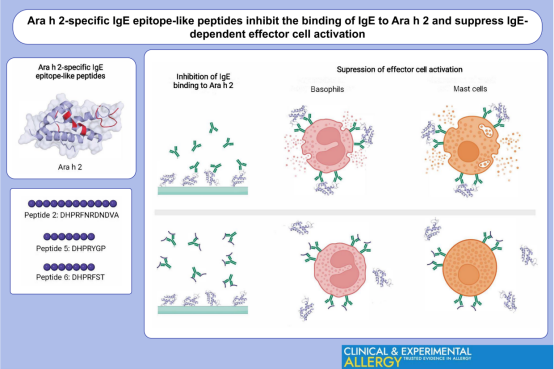Release date:2023-06-22

Clin Exp Allergy
[IF:5.131]
Title:Arah2-specific IgE epitope-like peptides inhibit the binding of IgE to Arah2 and suppress lgE-dependent effector cell activationDOI: 10.1111/cea.14314
Abstract:
Background: Clinical and experimental analyses indicate a pathognomonic role for allergen IgE crosslinking through epitope–paratope interactions as a major initial step in the cascade leading to effector cell activation and clinical manifestations of lgE-mediated food allergies. We aimed to undertake the initial development and assessment of Ara h 2-specific IgE epitope-like peptides that can bind to allergen specific IgE paratopes and suppress effector cell activation.
Methods: We performed biopanning, screening, IgE binding, selection and mapping of peptides. We generated synthetic peptides for use in all functional experiments. ImmunoCAP inhibition, basophil and mast cell activation tests, with LAD2 cells, a human mast cell line were performed. Twenty-six children or young adults who had peanut allergy were studied.
Results: We identified and selected three linear peptides (DHPRFNRDNDVA, DHPRYGP and DHPRFST), and immunoblot analyses revealed binding to lgE from peanut-allergic individuals. The peptide sequences were aligned to the disordered region corresponding to the loop between helices 2 and 3 of Ara h 2, and conformational mapping showed that the peptides match the surface of Ara h 2 and h 6 but not other peanut allergens. In ImmunoCAP inhibition experiments, the peptides significantly inhibit the binding of IgE to Ara h 2 (p< 0.001). In basophil and mast cell activation tests, the peptides significantly suppressed Ara h 2-induced effector cell activation (p<0 .05) and increased the half-maximal Ara h 2 effective concentration (p<0 .05). Binding of the peptides to specific IgEs did not induce activation of basophils or mast cells.
Conclusions: These studies show that the indicated peptides reduce the allergenic activity of Ara h 2 and suppress lgE-dependent basophil and mast cell activation. These observations may suggest a novel therapeutic strategy for food allergy based on epitope–paratop blocking.
First Author: Peter Korošec
Corresponding author: Peter Korošec
Correspondence: Peter Korošec, University Clinic of Respiratory and Allergic Diseases Golnik, Golnik 36, 4204 Golnik, Slovenia.
Email: peter.korosec@klinika-golnik.si
开云电子(中国)官方网站 | 华亿首页(中国)网页版 | 开云网页版 | 天博手机网页(中国)有限公司 | 千亿体育线上平台中国有限公司 | 米兰手机在线登入 | 米乐官方网页版 | 华亿网页版 | 三亿体育首页(中国)网站首页 |
 华亿体育(中国)游戏平台
华亿体育(中国)游戏平台
